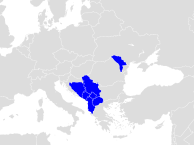CEFTA

In December 2006, Albania, Bosnia and Herzegovina, Croatia, Macedonia, Moldova, Montenegro, Serbia and the United Nations Interim Administration Mission in Kosovo (UNMIK) on behalf of Kosovo in accordance with United Nations Security Council Resolution 1244 signed an agreement to amend and expand the Central European Free Trade Agreement (CEFTA). The agreement, which took effect in 2007, covers trade in goods and services and investment.
last update: May 2012
Photo: Marko7/Wikipedia/CC BY-SA 3.0
| 16-Jan-2013
Bsanna News | 9-Nov-2012
Representatives, policy makers and experts from eight signatory countries of the Central European Free Trade Agreement (CEFTA) gathered in Tirana on Wednesday to examine progress and economic impact to date and debate new challenges and potential future developments of the agreement.
 :
CEFTA
:
CEFTA
| 8-Apr-2012
Serbia recorded a USD 116.4 million trade surplus with the countries of the Central European Free Trade Agreement (CEFTA) over the first two months of 2012, resulting mostly from export of agricultural products, according to data from the Statistical Office of the Republic of Serbia.
| 5-Nov-2011
Brussels has refused to renew the duty-free agreement with Macedonia. The free export resolution expired in December last year and documents for its renewal have not been prepared yet.
Bosnia News | 20-Oct-2008
The Central European Free Trade Agreement (CEFTA), a trade agreement between Non-EU countries in Central and South-Eastern Europe, has failed to deliver positive impacts for Bosnia.
BIRN | 15-Sep-2007
Bosnian opponents of CEFTA — the Central European Free Trade Agreement — argue that the country’s agriculture and food industries are not yet ready to compete with their neighbors.


